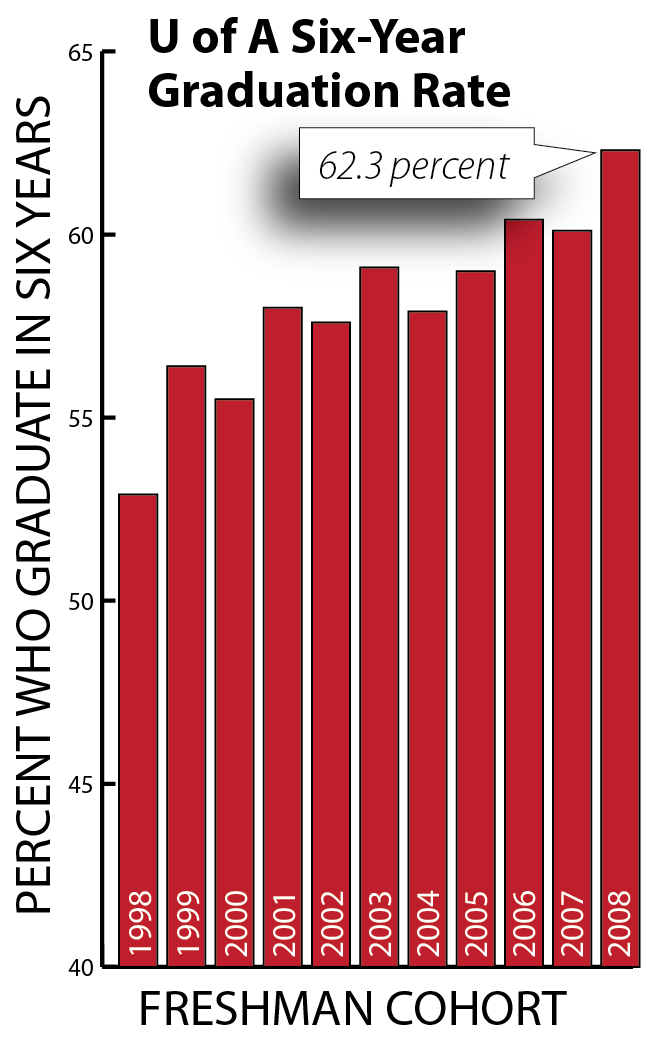FAYETTEVILLE – The University of Arkansas has increased the percentage of students who graduated within six years, recording the highest graduation rate since the institution began tracking the statistic in 1985.
The graduation rate improved to 62.3 percent for students who entered the university as freshmen in the fall of 2008. Each academic year’s group of first-time, full-time, degree-seeking freshman becomes part of what’s called a “cohort.” The cohort’s graduation rates are tracked and become part of the institution’s common data set. Last year’s graduation rate, by federal definitions, was 60.1 percent.
“This is great news for the University of Arkansas,” said Chancellor G. David Gearhart. “It’s not a sprint, but a marathon, to attain higher graduation rates and we’re seeing the results of many improvements including the increased academic potential of our student body. Our graduation rate is important. It’s the reason we’re here – to help people attain a college degree – and it’s also one of the measures by which we can demonstrate to our stakeholders our quality, value and success. I want to commend Provost Sharon Gaber and her group for their efforts in this positive growth.”
In 2010, Provost Sharon Gaber appointed a Destination Graduation Task Force to refocus the institution’s efforts. The task force was co-chaired by Karen Hodges, director of the office of academic success, and Ashok Saxena, then dean of the college of engineering and currently chair of the new biomedical engineering department in the college.
The task force identified a number of potential barriers to student success. Following up on the recommendations of the group, Gaber initiated a plan that included increased academic tutoring and support, adding professional advisers to help counsel students toward graduation, reviewing university policies on registration holds and student debt to the institution, and enhanced financial management information for students.
“A focus on class attendance led to a pilot project of checking attendance in large classes with the goal of helping students understand how critical going to class is for their academic success,” Gaber said. “Efforts in diversity affairs to provide tutoring and advising through the Multicultural Center, plus student affairs initiatives including student surveys, enhanced learning communities, and campus and community engagement helped focus campuswide attention on graduation.”
Other programs expected to contribute further to improvements in retention and graduation include the new freshman transition class, University Perspectives, which is in its second year. Efforts to support freshman students in the Sam M. Walton College of Business and the College of Engineering have also increased the number of students who remain in school and graduate within those colleges as well as from the university.
The increase to 62.3 percent puts the university closer to its goal of graduating 66 percent of its entering, full-time freshmen by 2015.
“Going forward, the Office of Graduation and Retention will have a stronger base on which to build toward meeting the university’s goals,” Gaber said.
“Although the standard rate is based on graduation within six years, an equally encouraging sign is the improvement in the university’s percentage of students who graduate within four years,” said Gary Gunderman, executive director of the office of institutional research and assessment. “Of the students who entered in the fall of 2010, 42.1 percent have already graduated, the first time that the four-year rate has exceeded 40 percent.”
“We’re seeing that the financial assistance through the lottery-funded scholarship with its focus on graduation in four years also seems to have had an impact on students earning a degree within four years,” Van Laningham said. “Helping students graduate faster saves them money and helps economic development by getting them into the workforce sooner.”
About the University of Arkansas: The University of Arkansas provides an internationally competitive education for undergraduate and graduate students in a wide spectrum of disciplines. The university contributes new knowledge, economic development, basic and applied research and creative activity while also providing service to academic and professional disciplines. The Carnegie Foundation classifies the University of Arkansas among only 2 percent of universities in America that have the highest level of research activity. Founded in 1871, the University of Arkansas comprises 10 colleges and schools and offers more than 200 academic programs. The university maintains a low student-to-faculty ratio of 19:1 that promotes personal attention and mentoring opportunities. U.S. News & World Report ranks the University of Arkansas 63 among the 623 American public research universities, and the university’s goal is be top 50 by the celebration of its 150th anniversary in 2021.
Contacts
Kathy Van Laningham, vice provost for planning
Office of the Provost
479-575-5910, kvl@uark.edu
Gary Gunderman, executive director
Office of Institutional Research and Assessment
479-575-4652, ggunderm@uark.edu
